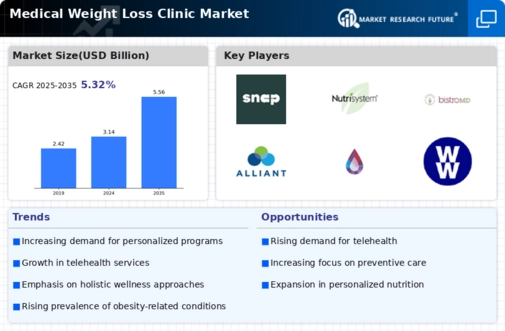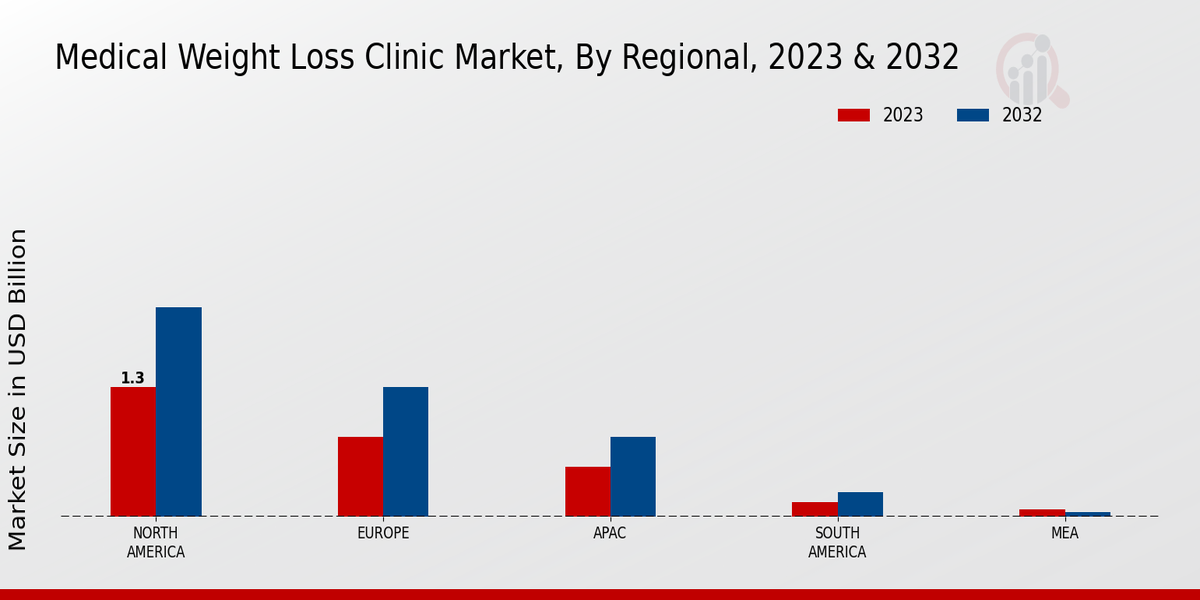Rising Obesity Rates
The Global Medical Weight Loss Clinic Market Industry is significantly influenced by the increasing prevalence of obesity worldwide. According to the World Health Organization, obesity rates have tripled since 1975, with over 650 million adults classified as obese in 2022. This alarming trend is likely to drive demand for medical weight loss clinics, as individuals seek professional assistance in managing their weight. The market is projected to reach 3.14 USD Billion in 2024, reflecting a growing recognition of the health risks associated with obesity, such as diabetes and cardiovascular diseases. As awareness continues to rise, the Global Medical Weight Loss Clinic Market Industry is expected to expand rapidly.
Market Growth Projections
The Global Medical Weight Loss Clinic Market Industry is poised for substantial growth, with projections indicating a market size of 5.56 USD Billion by 2035. This anticipated growth is underpinned by various factors, including rising obesity rates, increased health consciousness, and advancements in technology. The market is expected to experience a CAGR of 5.33% from 2025 to 2035, reflecting a robust demand for medical weight loss services. As more individuals seek professional assistance in managing their weight, the industry is likely to expand, offering a range of innovative solutions to meet diverse consumer needs.
Technological Advancements
Technological innovations play a crucial role in shaping the Global Medical Weight Loss Clinic Market Industry. The integration of advanced medical technologies, such as telemedicine and personalized health apps, enhances the accessibility and effectiveness of weight loss programs. For instance, clinics are increasingly utilizing data analytics to tailor weight loss plans to individual needs, improving outcomes. These advancements not only streamline the patient experience but also attract a broader clientele. As technology continues to evolve, the market is expected to expand, with projections indicating a growth to 5.56 USD Billion by 2035, reflecting the potential of technology-driven solutions in weight management.
Growing Health Consciousness
In recent years, there has been a notable shift towards health consciousness among consumers, which is positively impacting the Global Medical Weight Loss Clinic Market Industry. Individuals are increasingly prioritizing their health and well-being, leading to a surge in demand for weight management solutions. This trend is evidenced by the rise in health-related searches and the popularity of fitness programs. As people become more aware of the benefits of maintaining a healthy weight, medical weight loss clinics are likely to see increased patronage. The market is anticipated to grow at a CAGR of 5.33% from 2025 to 2035, indicating a sustained interest in professional weight loss services.
Increased Healthcare Expenditure
The Global Medical Weight Loss Clinic Market Industry is also driven by rising healthcare expenditure across various regions. Governments and private sectors are investing more in healthcare services, which includes funding for weight management programs. This increase in expenditure is likely to facilitate greater access to medical weight loss clinics, making them more appealing to individuals seeking assistance. As healthcare systems evolve, the emphasis on preventive care and chronic disease management is expected to bolster the market. With the market projected to reach 3.14 USD Billion in 2024, the financial commitment to healthcare is a key driver of growth in the Global Medical Weight Loss Clinic Market Industry.
Regulatory Support and Guidelines
Regulatory support and guidelines from health authorities are essential drivers of the Global Medical Weight Loss Clinic Market Industry. Governments are increasingly recognizing the importance of addressing obesity and its associated health risks, leading to the establishment of policies that promote weight management initiatives. These regulations often encourage the development of medical weight loss clinics, providing a framework for safe and effective treatment options. As these guidelines become more prevalent, they are likely to enhance consumer trust and encourage individuals to seek professional help for weight management. This supportive environment is expected to contribute to the market's growth trajectory.














